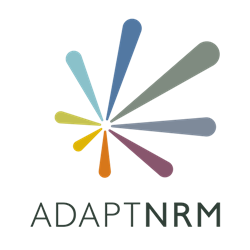National Project (AdaptNRM) NRM Collection
Body text
This collection contains materials produced by the National Project (AdaptNRM) of the Climate Change Impacts and Adaptation Research Grants Program. The Program aims to improve the capacity of regional Natural Resource Management (NRM) organisations in Australia to plan for climate change.
This program was developed as part of the Australian Government's Regional NRM Planning for Climate Change Fund.
The National Project was led by CSIRO. It sought to deliver a set of tailored information and data products of widespread importance in NRM planning relating to climate vulnerability and impacts on biodiversity. The project complements the program's individual Cluster projects by providing those aspects of regionally relevant information that could most efficiently be delivered in a combined national package.
You may also wish to visit the AdaptNRM website to explore the five easy-to-understand modules developed by the project, presented with synthesised key messages and supporting technical guides and datasets.
The modules are:
Adaptation Planning Weeds and Climate Change Implications for Biodiversity Adaptation of Biodiversity Shared Learning
Categorization
Contents
The NRM Adaptation Checklist: Supporting climate adaptation planning and decision-making for regional NRM.
This AdaptNRM guide is designed to support climate change adaptation planning by NRM groups. It has been designed to help evaluation, prompt practitioners about where changes to their plans might be needed, and provide additional information which can support the amendment of plans.
Weeds and Climate Change: Supporting weed management adaptation
This AdaptNRM guide synthesises impacts and adaptation information that is likely to be broadly applicable across much of Australia to assist NRM Groups with regional planning for weed management.
Implications of Climate Change for Biodiversity: A community-level modelling approach
This AdaptNRM guide introduces a series of new measures based on ecological similarity to assess the potential for change in biodiversity under climate change at scales relevant to planning. It is intended to support assessment and lead into strategic planning in NRM. In addition, this guide supports a series of maps in poster format and data layers. This guide explains how to interpret and use this information.
Helping Biodiversity Adapt: Supporting climate adaptation planning using a community-level modelling approach
This AdaptNRM Guide moves beyond the implications of climate change, to introduce new principles for biodiversity conservation and new measures for evaluating potential actions to help biodiversity adapt to climate change.
Weeds and Climate Change: Climex models
This dataset is part of the AdaptNRM Weeds and Climate Change module. The data collection in CSIRO's Data Access Portal features global and Australian maps of Species Distribution Models (SDM) for current and 2070 climates for invasive plant species for which there are published CLIMEX models.
Implications of Climate Change for Biodiversity: Maps and Datasets
The AdaptNRM Guide: Implications of Climate Change for Biodiversity: a community-level modelling approach, is accompanied by a series of maps and datasets. These represent supporting materials and information about the community-level biodiversity models applied to climate change. The amps and datasets are organised by four biological groups (vascular plants, mammals, reptiles and amphibians), two climate change scenarios (1990-2050 MIROC5 and CanESM2 for RCP8.5), and six measures of change in biodiversity.
Helping Biodiversity Adapt: Maps and Datasets
The AdaptNRM Guide: Helping Biodiversity Adapt: Supporting climate adaptation planning using a community-level modelling approach, is accompanied by a series of datasets. These represent supporting materials and information about the community-level biodiversity models applied to climate change. Where applicable, the datasets are organised by four biological groups (vascular plants, mammals, reptiles and amphibians), two climate change scenarios (1990-2050 MIROC5 and CanESM2 for RCP8.5), and measures of change in biodiversity.

